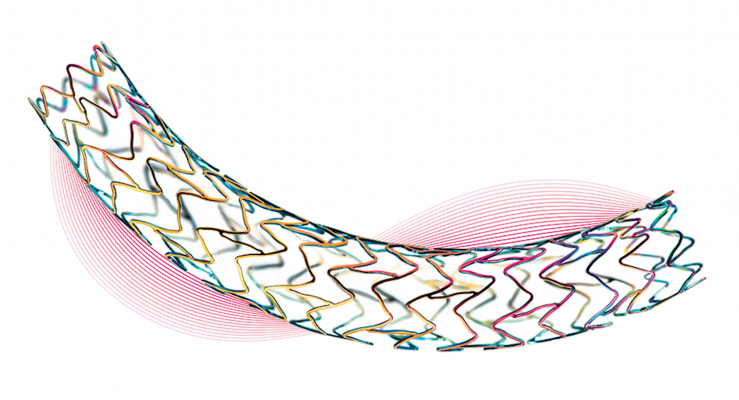
The Biotronik Osiro is an ultra thin strut, sirolimus-eluting stent.
October 4, 2018 – Investigators unveiled clinical data from the independent BIONYX and SORT OUT IX all-comers trials which respectively compared durable polymer Resolute Onyx and polymer-free BioFreedom to bioresorbable polymer Orsiro.[1,2] The data was presented at the 2018 Transcatheter Cardiovascular Therapeutics (TCT) scientific symposium in September.
In both studies, patients who were treated with the durable or polymer free stents showed no additional benefit at 12 months in target vessel or lesion failure and its components of cardiac death, myocardial infarction and target lesion/vessel revascularization.
The BIONYX study included 2,488 all-comer patients and assessed the safety and efficacy of the Medtronic Resolute Onyx durable polymer drug eluting stent (DES) compared to the ultrathin strut bioresorbable polymer Orsiro DES. The primary endpoint of target vessel failure at one year showed no statistically significant difference in outcomes for Resolute Onyx (n=1,243) at 4.5% compared to 4.7% (p=0.77) with Orsiro (n=1,245).[1] Stent thrombosis was also exceptionally low for both devices1.
“The results of this head-to-head comparison of the ultrathin strut sirolimus-eluting Orsiro stent with a novel zotarolimus-eluting stent confirm the excellent results of the Orsiro stent, seen in several previous head-to-head comparisons with newer-generation DES,” commented Prof. Clemens von Birgelen, Thoraxcentrum Twente, Enschede, the Netherlands. “At one-year follow-up, we found an excellent and similar safety and efficacy for both stents in all-comers. As our study does not have the statistical power to assess rare events, the stent thrombosis data are hypothesis-generating only and could be the result of a play of chance.”
The SORT OUT IX trial included 3,151 all-comer patients randomized to receive either the thick strut stainless steel BioFreedom polymer-free DES or the ultrathin strut bioresorbable polymer Orsiro DES. The trial was also presented in the same late-breaking session and again showed excellent results for the ultrathin device. The primary endpoint of target lesion failure at one year showed low rates for Orsiro 4% compared to the BioFreedom 5.3% (p for non-inferiority=0.01) and a similar low rate of definite/probable stent thrombosis for both devices: Orsiro 1.1% compared to BioFreedom 1% (p=0.73).
More insights into the SORT-OUT IX study — Polymer-Free BioFreedom Stent as Safe as Orsiro, but Not as Effective
Orsiro: Lower Event Rates Drive Lower In-Hospital Costs
Also presented at TCT were the results of a Health Economic evaluation of the Orsiro stent in comparison to Xience, based on the statistically significant improved outcomes for Orsiro in the BIOFLOW-V FDA pivotal trial.[3]
An assessment of the clinical and cost impact in the USA was performed resulting in an estimated net reduction in medical cost of $125 per patient when using Orsiro compared to Xience, with $115 accrued during the initial admission.
Find links to TCT 2018 Late-breaking Cardiovascular Clinical Trials and Videos
Read the February 2019 article FDA Clears Biotronik Orsiro Stent That Outperforms Xience
For more information: www.biotronik.com
References:
1. von Birgelen C, BIONYX: A Randomized Trial Evaluating a Thin Composite Wire Strut Durable Polymer-Based DES Compared with an Ultra-Thin Strut Bioresorbable Polymer-Based DES in an All-Comers Patient Population, Presented at TCT, San Diego USA, September 2018.
2. Okkels Jensen L, SORT OUT IX: A Randomized Trial Comparing a Polymer-Free Coronary Drug-Eluting Stent With an Ultra-Thin Strut Bioresorbable Polymer-Based Drug-Eluting Stent in an All-Comers Patient Population, Presented at TCT, San Diego USA, September 2018.
3. Mattke S, et al. Health Economic Evaluation of an Ultrathin, Bioresorbable Polymer Sirolimus-Eluting Coronary Stent Compared to a Thin, Durable Polymer Everolimus-Eluting Stent. Presented at TCT, September 2018, San Diego USA.


 January 05, 2026
January 05, 2026 









